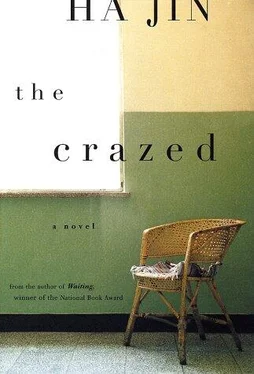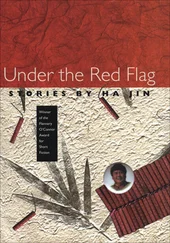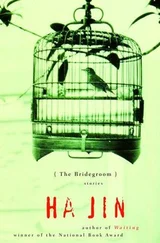Then the thought occurred to me that Vice Principal Huang might have known about the affair as well. His words to Mr. Yang—“Let her decide what to do herself, all right?”— now began to make sense. He must have been referring to Weiya. No wonder she feared that she might get kicked out of the university.
Mr. Yang had been reciting poetry while I was away. When I came back, he was chanting an ancient lyric:
Beyond the curtain the rain drizzles.
Spring is fading.
A satin quilt cannot keep out
The cold of a tattered night.
In dream I have forgotten I’m a guest,
Still indulging in merriment.
Do not lean upon the balustrade alone.
Oh, the boundless rivers and mountains,
How easy it was to leave them,
How hard it is to see them again!
Spring is gone with fallen
Flowers in flowing streams—
A difference like heaven and earth.
“What a sad poem, heartbreakingly sad,” he muttered. “Like the spring, I must be leaving too.”
“Where are you going?” I asked.
“Canada.”
“What will you do there?”
“I shall write a book on Ezra Pound. Have you heard of him?”
“Yes, he translated some of Li Po’s poems.”
“Correct. He also translated Book of Songs in its entirety with little knowledge of Chinese. My friend at UC-Berkeley told me that there were hundreds of mistakes in the translation, so I’m going to write a book entitled Ezra Pound: A Multitude of Fallacies. ”
He was ludicrous and again possessed by the academic hysteria that often prompted scholars to trash one another’s books and papers. I asked him, “Why not go to the United States? You may find more material for such a book there.”
“Canada is a larger country, and my soul needs more space.” I kept quiet and wondered why he talked so much about his soul and Canada lately. He used to insist that he was a dialectical materialist who didn’t believe in the soul. Had he changed into an idealist? Or had he become religious at heart? Or had his physical deterioration intensified his awareness of the spiritual life? In any case, he appeared to be struggling to take possession of his soul, yearning for some free, unsullied space, which in his case, absurd as it seems, might be symbolized by Canada.
At last Meimei’s letter arrived, which upset me. She wrote:
May 17, 1989
Jian:
I’m appalled to hear you want to withdraw from the exams. If you do, you will make an egregious mistake you will live to regret. Why should you squander your time and energy like this? For a whole year you studied for the exams, but now, approaching the final moment, you quail and stop trying. I cannot help but conclude that you are either out of your mind or have lost confidence. If you try and don’t succeed, I won’t blame you, for you have made your effort. But without giving it a fight, you want to call off the battle. I have to believe that you’re not serious about our relationship. It hurts me to say this, yet the fact is clear: you’re willing to let go of the only opportunity for us to be together in Beijing. How can I think otherwise?
You have your choices, and I won’t pressure you to decide on anything. But please cherish our relationship, cherish this unique opportunity in your life, cherish my father’s expectations of you. Just imagine how happy he will be if you matriculate at Beijing University. Please stop loafing your time away and indulging in philosophical speculations. Now is the time for action. Put up a fight!
Whatever you choose to do, I’m adamant about my plan. I shall take the exams next week (the date remains unchanged). I want to live in the capital and pursue my medical career here. Please don’t write to me if there’s no good news. I don’t want to be distracted before I slog through the whole thing.
Yours,
Meimei
PS: We are both educated grown-ups and shouldn’t be too emotional about this sudden twist in our relationship. If we have to part, let us be candid and not hold each other back for long.
Her letters depressed me, not because she couldn’t understand my predicament (as she hadn’t fully witnessed her father’s wretched condition) but because she seemed willing, as the postscript indicated, to break up with me if necessary. I used to think that since we had spent so much time together, she would treat me as more than just a boyfriend. I was her fiancé, expected to marry her within two years. But it looked like I was no longer indispensable to her. Normally in a situation like this, a woman would accuse her man of having changed heart or having found someone else, but Meimei seemed too proud to say anything like that. She must have felt superior to me. Admittedly, she was a better match. She was so pretty that men would turn to look after her in the street. Her self-confidence unnerved me.
Yet since I last wrote her, I had grown more determined to abandon the exams, which would be given in less than two weeks. Though I hadn’t yet decided what to do after graduation, recently a voice went on in my head, “I won’t live his kind of life!” I meant my teacher’s.
That night my roommates and I listened to the Voice of America again. Martial law had been declared in Beijing. Thousands of hunger-striking students had occupied Tiananmen Square for days; some of them began to collapse and were being shipped to hospitals to be put on IVs. We could hear the sirens of ambulances screaming in the background. It was disturbing to learn that several field armies had assembled on the outskirts of Beijing, ready to implement martial law. The radio said more troops were on their way to the capital.
Mantao had heard that three weeks ago a few students had knelt before the People’s Hall with a written petition raised above their heads, but no national leaders would come out to accept the letter, though a good number of them were at a conference inside the building. This piece of news evoked mixed feelings in me.
“Why were they so frightened of the students?” said Mantao, referring to the top leaders. “Nobody would bite them if they came out and said a few kind words to the petitioners.”
“Now those old farts have become the target of the revolution started by themselves,” said Huran.
I chimed in, “They must think the students want to share power with them. If they accepted the petition, they’d have to answer it soon. That would indirectly admit the existence of the student organization, which has never been recognized officially. They wouldn’t set up a precedent with this case.”
“Good point,” said Huran. “But those students were clever, kneeling in front of that building for the sake of effect. They’re not subjects of an emperor, but they acted as if they were, just to embarrass the officials.”
I laughed. He was right. I had never knelt down to anybody in my life. The students indeed seemed to have overacted.
“Damn, I wish I were there,” Mantao said with his eyebrows straightened. “More people should go to Beijing and smash ‘the Imperial Court.’ ” He hated the Communists because his mother, when he was four, had drowned herself in a well, unable to endure beatings by the Red Guards. Ironically she had been a Party member, a middling official. Not until a few years ago had her name been rehabilitated.
“I hope the old fogies won’t set the army on the students,” I said.
“You think the troops were deployed there just for show?” Huran smiled, displaying his long teeth.
I wondered how Meimei could concentrate on her textbooks while the students in Beijing were engaged in such a historic struggle, which to many of them was a matter that would decide the nation’s fate. She was really tough-minded, rational like a clock.
Читать дальше

![Lao Zi - Dao De Jing [Tao Te Ching] (english)](/books/3890/lao-zi-dao-de-jing-tao-te-ching-english-thumb.webp)
![Lao Zi - Dao De Jing [Tao Te Ching] (chinese)](/books/3891/lao-zi-dao-de-jing-tao-te-ching-chinese-thumb.webp)
![Lao Zi - Dao De Jing [Tao Te Ching] (espanol)](/books/3892/lao-zi-dao-de-jing-tao-te-ching-espanol-thumb.webp)







